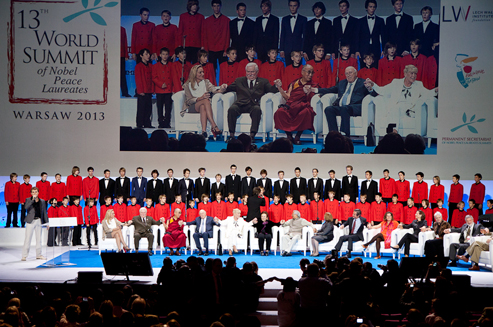At the end of the 13th World Summit Nobel Peace Laureates issued a final statement:
“There are universal values that are found in every tradition and religion. When these values are honored, stability and justice are the consequence; and when they are ignored instability, conflict, and tyranny can occur. Many cultures teach that we should treat others as we wish to be treated. This is the essence of human solidarity: treat everyone – individuals, communities, and nations – based on this Golden Rule.
When nations work for common goals great good can be achieved. Sustainable and inclusive development, security and human rights are interdependent. There is no option for failure when addressing the common threats posed by a destabilized climate, polluted oceans, denuded forests, violent conflicts, nuclear, biological and chemical weapons and war. Succeeding in eliminating these threats will achieve global common goods of the highest value. Failure to do so will impact the lives of every individual in every country. This truth must inform our understanding that human solidarity is a necessity. There can be no national security without shared human security.
Recent events in Afghanistan, Iraq, Syria and Libya remind us that political solutions cannot be imposed by military means. We know that political solutions are necessary for peace. The requirement that all participants be treated with dignity, on the basis of democracy, the rule of law and constitutional principles, is necessary for peace. We have worked to achieve human rights without violence. In different times and places, we have succeeded in bringing peace into being.
We call on people everywhere — especially government leaders, policymakers, and those entrusted with the security of their countries — to reflect on how our histories, our economies, and our destinies are entwined. Sustainable peace requires that we work, not for unilateral military or economic advantage, but for shared security and sustainable development. Our lives are so bound up together that “we” cannot be safe unless “they” and their children are also safe. As we have seen time and again, to threaten another whom “we” fear only increases “their” fear, resulting in an escalating cycle of threats. Even when violent conflict is avoided, repeatedly sinking money into weapons and military systems diverts essential investments in health, education, the environment, and economic development.
An emergent reality of this modern age is the internet which weaves us together with new opportunities for human solidarity. The modern age is also defined by two icons: the mushroom cloud and the picture of the planet earth seen from outer space. One reminds us of our frailty and the fact that through misunderstanding, fear, and differences derived from a past era we still stand ready to destroy this precious web of life of which humanity is a single thread. The other reminds us of the majesty and mystery of our lives on this small planet spinning in infinite space with a thin layer of atmosphere in which all the passions and actions of saints, sinners, empires, kingdoms, families and individuals have played out their short precious lives, and where love and beauty remain possible every day.
What will make the difference in our future will be whether we cultivate or reject human solidarity. We do not ask you to join us. We remind you that we are already joined together as one human family.
We thus call for:
● new thinking about achieving peace. We have to grow out of the obsolete philosophy of “if you want peace, prepare for war”. It is now obvious that if we want peace we have to prepare for peace.
● the opening of negotiations to obtain the universal legal and verifiable elimination of nuclear weapons. Nuclear weapons are an existential threat to humanity and must never be used again. We therefore welcome the growing recognition by a number of states that the catastrophic consequences of the use of nuclear weapons require decisive action to outlaw and eliminate them. We welcome the upcoming Mexico Conference to further explore the humanitarian consequences of nuclear weapons.
● a fresh look at the need to address structural economic and social injustices which often give rise to violence and armed conflict.
● a reduction in the enormous resources spent on militarism. In 2012 the world’s governments spent $1.7 trillion on their armed forces. We cannot afford to go on misusing the world’s resources on warfare, when the basic needs and interests of so many people are not being met. As Ban Ki-moon tells us: “Our world is over-armed and peace is under-funded.”
● an increased recognition of the important role that civil society, especially women, can play in preventing war and conflict.
● achieving negotiated and peaceful solutions that include all impacted parties to all conflicts such as those in Syria and elsewhere
● a recognition that climate change is a threat to peace and human security. ”
Source: The Summit of Nobel Peace Laureates
Photo © Anna Karahan


